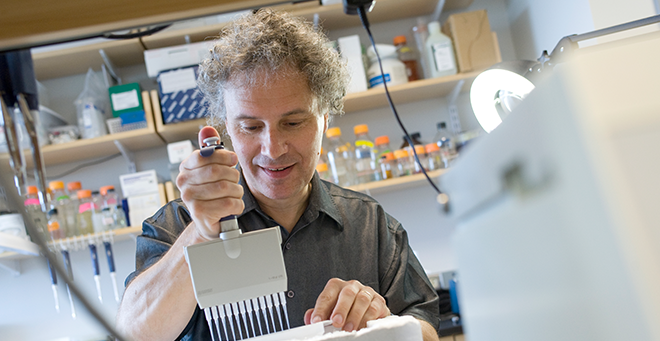
Internationally renowned geneticist and pioneer of microRNA, Victor R. Ambros, PhD, who will share the 2024 Nobel Prize in Physiology or Medicine for his co-discovery of microRNA, is the Silverman Chair in Natural Sciences and professor of molecular medicine at UMass Chan Medical School in Worcester, Mass.
Dr. Ambros joined UMass Chan in 2007 from Dartmouth Medical School in Hanover, New Hampshire, where he was a professor of genetics. In 1993, his lab was the first to discover microRNA, which resulted from the heterochronic lin-4 gene in C. elegans. MicroRNAs are single-stranded RNA molecules that play a critical role in gene regulation. They are created (“encoded”) by genes that are transcribed from DNA. Unlike most genetic transcription, microRNAs are not translated into protein. Instead, the main function of microRNA is to slow down gene expression; recent research suggests they may also play a role in positive gene regulation as well.
The growing awareness of microRNAs and their functions has transformed the study of molecular biology. These extremely tiny strands of genetic material play an important role in most biological functions governing health and disease. For example, microRNA is a critical component in embryonic growth and development and has been found to play a part in many cancers. Since his initial discovery, Ambros and others have identified a large range of genes for diverse microRNAs. Today, Ambros continues his research on microRNA and gene regulation. He is focused on understanding the genetic and molecular mechanisms that trigger cell division, differentiation and morphogenesis and the developmental roles of microRNAs and related regulatory pathways.
Ambros received his undergraduate degree at the Massachusetts Institute of Technology (MIT) in 1975. He continued his graduate studies at MIT, earning his doctorate in 1979 and completing a postdoctoral fellowship in 1983. During graduate school, he worked with David Baltimore, PhD, a co-recipient of the 1975 Nobel Prize in physiology or medicine for discoveries related to the interaction between tumor viruses and genetic material of the cell. In Dr. Baltimore’s lab, Ambros studied the poliovirus genome structure and replication.
Ambros conducted his postdoctoral research in the lab of H. Robert Horvitz, PhD, who shared the 2002 Nobel Prize in physiology or medicine for his research related to genetic regulation of organ development and programmed cell death. As a fellow in Dr. Horvitz’s lab, Ambros focused on genetic pathways that direct developmental timing in C. elegans (a small nematode extensively studied in biomedical research).
Ambrose joined Harvard University in 1984 as a faculty member, continuing his research there until 1992, when he moved to Dartmouth Medical School.
Ambros was honored for his research on gene regulation when he was elected to the National Academy of Sciences in May 2007. He has received numerous honors for his scientific achievements, including the 2005 Lewis S. Rosenstiel Award for Distinguished Work in Basic Medical Research, which he shares with Gary B. Ruvkun, PhD, from Massachusetts General Hospital, and with 2006 Nobel Laureates Craig Mello, PhD, and Andrew Fire, PhD.
Ambros is also a co-recipient of the 2002 Newcomb Cleveland Prize from the American Association for the Advancement of Science. He was awarded the 2006 Genetics Society of America Medal for outstanding contributions in the field of genetics in the past 15 years.
In 2008, Ambros shared the Benjamin Franklin Medal in Life Science from the Franklin Institute with Dr. Ruvkun and David C. Baulcombe, PhD, of the University of Cambridge, UK. That same year, Ambros shared the Lasker Award for Medical Research with Ruvkun and Dr. Baulcombe. In 2009, Ambros and Ruvkun were awarded the Louisa Gross Horwitz Prize and the Meira and Shaul G. Massry Prize. Ambros received the 2012 Dr. Paul Janssen Award for Biomedical Research with Ruvkun. In 2013, Keio University honored Ambros with the 18th Keio Medical Science Prize for “outstanding contribution to the field of medicine or life sciences.”
In 2014, Ambros was honored with three major prizes in the life sciences: the Wolf Prize in Medicine (with Ruvkun); the Gruber Genetics Prize (with Ruvkun and Baulcombe) and the Breakthrough Prize in Fundamental Physics and Life Sciences (with Ruvkun). In 2016, Ambros and Ruvkun were honored with the 2016 March of Dimes Prize and Richard B. Johnston, Jr. MD Prize in Developmental Biology.
In 2011, Ambros was elected to the American Academy of Arts & Sciences, joining some 200 Nobel laureates, more than 60 Pulitzer Prize winners and worldwide leaders drawn from the sciences, the arts and humanities. In 2018, he was elected by his peers as a fellow of the American Association for the Advancement of Science.
In recognition of Ambros’ accomplishments as a scientist and his influence as a mentor, H. Scott Silverman and his father Jeffrey L. Silverman endowed the Silverman Chair in Natural Sciences. The endowment symbolizes the Silvermans’ enthusiasm for Ambros’ work and arises from a long-time friendship formed in 1994 when the younger Silverman, a venture capitalist and investment fund manager, began his honors research thesis under Ambros’ guidance at Dartmouth.
Ambros is a member of several science-related organizations and has authored papers that have appeared in numerous publications, including Science, Developmental Cell and Genes and Development.